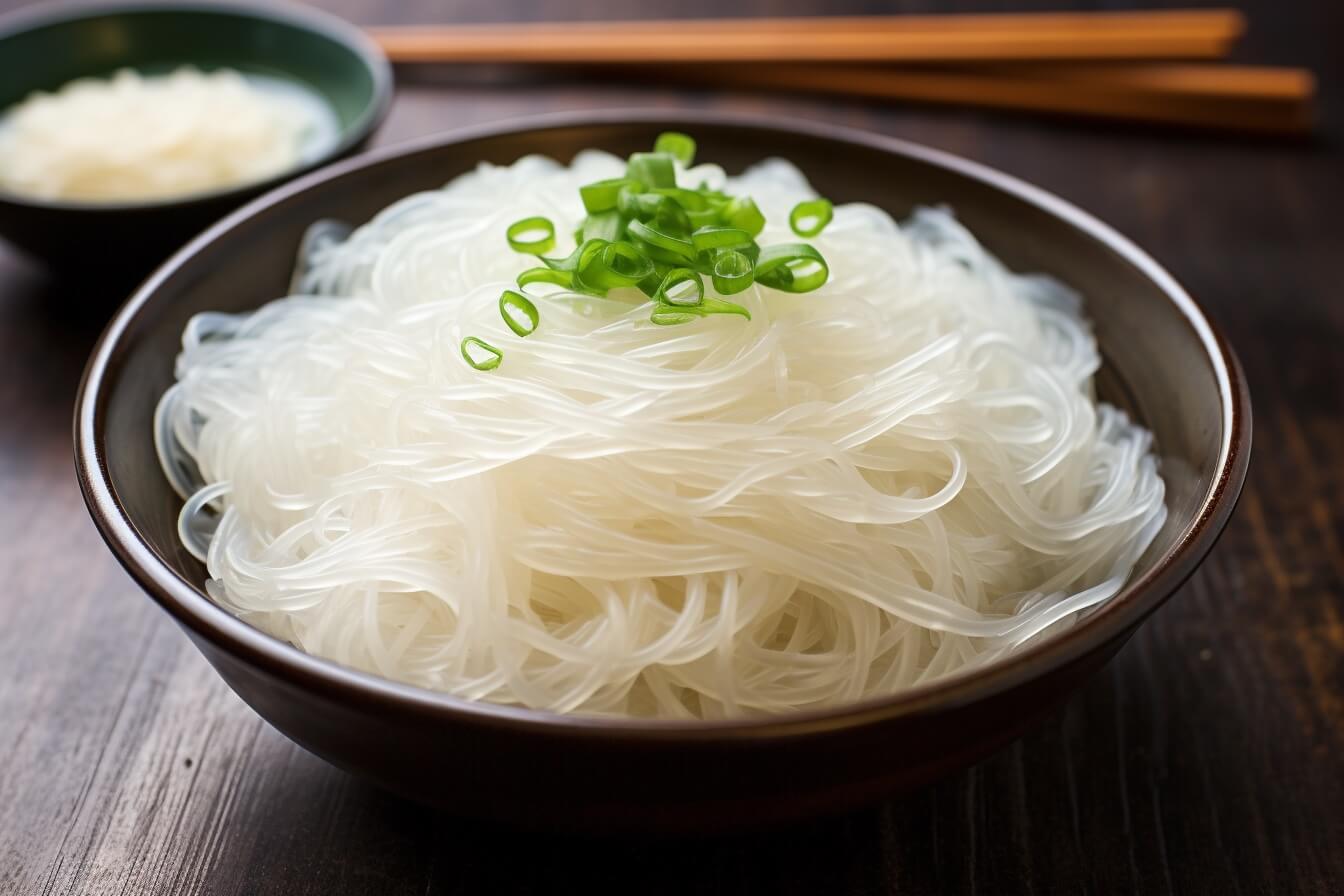Glucomannan has gained popularity in recent years, especially among those following intermittent fasting. Since it’s a fiber that is not metabolized by the body, it doesn’t cause an insulin response and is generally believed to not break a fast.
However, it’s important to note that glucomannan does contain 5 calories per serving, which technically breaks a certain type of fast. Nevertheless, many people still choose to incorporate glucomannan supplements or glucomannan powder into their fasting routine due to its potential benefits for appetite control and overall health.
What Is Glucomannan?
Glucomannan is a type of fiber derived from the roots of the konjac plant, scientifically known as Amorphophallus konjac (The Laboratory Rat, 2006).
Glucomannan is available as a supplement, in drink mixes, and is even added to food products like pasta and flour. Its exceptional ability to absorb water makes it one of the most viscous dietary fibers known (Nutr Hosp., 2004).
This means that when you consume glucomannan, it expands and forms a gel-like substance in your gut, which helps promote feelings of fullness and aid in weight loss. It’s also a soluble fiber, which means it helps regulate blood sugar levels and support gut health, according to CDC.
Glucomannan Benefits For Intermittent Fasting
When practicing intermittent fasting, glucomannan can be a valuable tool for managing hunger pangs during your fasting window. By expanding in the stomach, glucomannan signals to the brain that you’ve eaten a meal, helping to reduce the urge to snack or break your fast prematurely (J Obes., 2013).
By taking 3-6 capsules of glucomannan with a large glass of water whenever you feel hungry, you can help curb your appetite and stay on track with your fasting goals. This is especially beneficial if you tend to overeat or struggle with cravings during your fasting period.
In addition to its appetite suppressant properties, glucomannan has other benefits for weight management and overall health. Research suggests that it helps improve insulin sensitivity and decrease fasting blood glucose levels, which are important factors for maintaining a healthy weight and preventing chronic diseases like diabetes (Nutrients, 2023).
Furthermore, it has been shown to promote the growth of beneficial gut bacteria, which has a positive impact on digestion and overall gut health, which is important during intermittent fasting when the digestive system needs extra support (J Med Food., 2012).
Lastly, glucomannan has been shown to help prevent constipation, which is a common side effect of fasting. By promoting regular bowel movements, it will ensure that your body is functioning optimally and help you feel more comfortable during your fasting period (Nutrition, 2006).
Incorporating glucomannan into your intermittent fasting routine not only helps you lose weight but also supports your overall well-being.

Side Effects Of Glucomannan
Ironically, consuming glucomannan during fasting may lead to minor digestive discomfort such as bloating, flatulence, and abdominal discomfort. While glucomannan is generally considered safe and well-tolerated, these side effects are the most common and usually temporary (Nutr Hosp, 2004).
It is important to note that these side effects are mild and typically go away on their own. However, it is recommended to drink plenty of water when taking glucomannan to prevent any blockages in the esophagus or intestines (Clin Toxicol, 2007).
In addition to these potential digestive side effects, it’s worth mentioning that glucomannan has been associated with some rare but serious side effects.
In one case, a patient developed acute hepatitis of cholestatic type after taking a product based on konjac powder, which contains glucomannan (Journal of Hepatology, 2004). Another study suggested that acute hepatitis of cholestatic type has been associated with the use of glucomannan (Journal of Hepatology, 2005).
However, it is important to note that these are isolated cases and more research is needed to determine the exact relationship between glucomannan and hepatitis.
Occupational asthma has also been reported in individuals who were regularly exposed to glucomannan powder in their workplace. In particular, respiratory sensitization to konjac glucomannan has been reported in a food manufacturing worker (J Asthma, 2007).
These cases are rare, but it is important to be aware of these potential risks.
FAQs
Can you take weight loss supplements while fasting?
While some weight loss supplements may be consumed during fasting without breaking your fast, others may contain calories or stimulate an insulin response, effectively breaking the fast. It’s important to check the ingredients of your supplements carefully.
For a detailed exploration on this topic, read our guide on “Does Taking Supplements Break a Fast?“.
Does taking fiber supplements break a fast?
Fiber supplements like glucomannan typically don’t break a fast as they aren’t metabolized by the body, meaning they don’t trigger an insulin response. However, they do contain some calories, which could technically break certain types of fasts.
For a comprehensive understanding, check out our article “Does Fiber Break a Fast?“.
Does glucomannan work without food?
Yes, glucomannan works even without food. It’s often taken with water before meals. When it reaches the stomach, it absorbs water to form a bulky fiber which promotes a feeling of fullness, helping to reduce calorie intake.
Does glucomannan spike insulin?
No, glucomannan is a type of fiber and doesn’t cause a spike in insulin. In fact, it may help regulate blood sugar levels and improve insulin sensitivity.
What should you not take with glucomannan?
Glucomannan can interfere with the absorption of certain medications. It’s generally advised not to take glucomannan within an hour of taking other medicines or supplements.
For a more thorough examination of how medications and fasting interact, refer to our resource “Does Medication Break a Fast?“.
